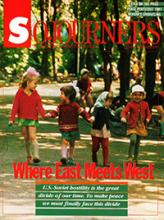Who is the "public" in public television? When your local station wants your money, they say "You are." But where are "you" when decisions are made about the content and direction of "your" programming?
Public television still delivers most of the worthwhile children's programming in the United States. And it can still occasionally cough up a revelation like "Eyes on the Prize" (see page 41 of this issue). But for the most part, public television today serves a very narrow cultural and political agenda, the boundaries of which are set by Reagan-appointed board members and (guess who?) our friends in the Fortune 500.
In the first year of the Reagan administration, public television stations aired a documentary on the Nicaraguan revolution titled "From the Ashes" that was partially funded by a Carter-era grant from the National Endowment for the Humanities (NEH). The next day Reaganaut NEH Director William Bennett (now secretary of education) announced his horror at public money going for pro-Sandinista propaganda. He said things like that wouldn't happen any more. And they haven't. The boards that make funding decisions at NEH and at the Corporation for Public Broadcasting (CPB) have been stacked with Reagan appointees bent on a cultural jihad against "unbalanced" programming, meaning anything that casts doubt on their vision of America and the world.
Read the Full Article

